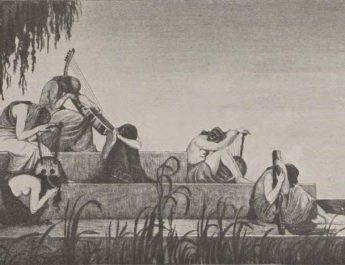Psalm 51:1-9
Narrative Lectionary 107
To the leader.I A PsalmII of David,III
I “leader” = natsach. Properly, something that glitters from a distance. So, something that stands out, excels, has status/standing (such as a chief musician or superintendent of Temple services). This can also mean to be permanent or enduring.
II “Psalm” = mizmor. From zamar (making music; used specially of music to worship God; music with singing, singing praise, singing psalms); may be from zamar (to trim or prune). This is a melody or a psalm.
III “David” = David. From the same as dod (beloved, love, uncle); the root may mean to boil, which is used figuratively to describe love. So, this implies someone you love such as a friend, a lover, or a close family member like an uncle. David’s name likely means something like “beloved one.”
when the prophetIV NathanV came to him, after he had gone in to Bathsheba.VI
IV “prophet” = nabi. This is prophet, prophecy, speaker, or someone inspired.
V “Nathan” = Natan. From natan (to give, put, set, offer; to give literally or figuratively). This is Nathan, meaning “given” or “[God] gives.”
VI “Bathsheba” = Bath-sheba. 11x in OT. From bath (daughter in a literal or figurative sense; can also be branch) {from ben (son literal or figurative; also, grandson, subject, nation); from banah (to build or obtain children)} + perhaps shaba (to swear, curse, vow, make a covenant; properly, to be complete; this is to seven oneself – as in affirming something so strongly it is as though it were said seven times) {perhaps from sheba (seven – the number of perfection/sacred fullness)}. This is Bathsheba, perhaps meaning “daughter of oath.”
1 Have mercy onVII me, O God,VIII
according to your steadfast love;IX
VII “have mercy on” = chanan. This is to beseech, show favor, be gracious. Properly, it is to bend in kindness to someone with less status.
VIII “God” = Elohim.
IX “steadfast love” = chesed. From chasad (being good, kind, merciful; may mean bowing one’s neck as is done in the presence of an equal for courtesy’s sake; so, if one in a superior position is treating you like an equal, that is what is captured here). This is favor, goodness, kindness, loving kindness, pity, reproach, or a good deed. When done by God to humanity, this is mercy/loving kindness. When done by humanity to God, it is piety.
according to your abundantX mercyXI
blot outXII my transgressions.XIII
X “abundant” = rob. From rabab (to be or become much or many, multiply). This is any kind of abundance.
XI “mercy” = racham. From the same as rechem (womb); from racham (to love, have compassion, have mercy); from racham (compassion, tender love, womb, compassion; the womb as that which cherishes the fetus). This is compassion, mercy, or tender love.
XII “blot out” = machah. This is to rub, which implies to erase. It can also be making something smooth with grease or oil. So, this could we wipe out, blot out, or destroy. Also, to touch or reach.
XIII “transgressions” = pesha. From pasha (to rebel, offend, quarrel; making a break from proper authority so can also refer to an apostate). This is transgression, rebellion, or sin. It could be a revolt on a national scale or an individual moral one.
2 WashXIV me thoroughlyXV from my iniquity,XVI
and cleanseXVII me from my sin.XVIII
XIV “wash” = kabas. This is to trample – washing by stomping feet. It can be fulling in a literal or figurative sense.
XV “thoroughly” = rabah. This is increasing in any aspect whether quantity, authority, size, quality, greatness, etc.
XVI “iniquity” = avon. Perhaps related to avah (to bend, twist, be amiss). This is sin, mischief, guilt, fault, punishment for iniquity, or moral evil.
XVII “cleanse” = taher. This is properly being bright, which implies being pure or clean. This word can also mean purge, cleanse, or purify. It can be clean in a ritual sense or a moral one (i.e. moral or holy).
XVIII “sin” = chatta’ah. From chata’ (to miss or go wrong and so to sin, bear the blame; it can also include the sense of forfeiting or lacking). This is sin itself as well as punishment for sin. It is sometimes used specifically to refer to sin that is habitual.
3 For I knowXIX my transgressions,
and my sin is everXX beforeXXI me.
XIX “know” = yada. This is to know, acknowledge, advise, answer, be aware, be acquainted with. Properly, this is to figure something out by seeing. It includes ideas of observation, recognition, and care about something. It can be used causatively for instruction, designation, and punishment.
XX “ever” = tamid. May come from a word that means to stretch. This word means an indefinite period of time. So, it could be regular or daily. It could also be constantly, continually, always, or perpetually.
XXI “before” = neged. From nagad (to declare, make conspicuous, stand in front, manifest, predict, explain). This is in front of, opposite to. It can refer to a counterpart or partner, one corresponding to or in the sight of.
4 Against you, you alone,XXII have I sinned,XXIII
and doneXXIV what is evilXXV in your sight,XXVI
XXII “alone” = bad. From badad (to divide or be separated; alone, solitary, lonely, isolated, straggler). This is apart, alone, separation, body part, tree branch, except. It can also be a city’s chief.
XXIII “sinned” = chata. Related to “sin” in v2. See note XVIII above.
XXIV “done” = asah. This is to make, do, act, appoint, become in many senses.
XXV “evil” = ra’. From ra’a’ (to be evil, bad, afflict; properly, to spoil – to destroy by breaking into pieces; figuratively, to cause something to be worthless; this is bad in a physical, social, or moral sense; that which displeases, to do harm or mischief, to punish or vex). This is bad, disagreeable, that which causes pain, misery, something having little or no value, something that is ethically bad, wicked, injury, calamity. This refers to anything that is not what it ought to be – a natural disaster, a disfigurement, an injury, a sin.
XXVI “sight” = ayin. This is eye in a literal or figurative sense so eye, appearance, favor, or a fountain (the eye of the landscape).
so that you are justifiedXXVII in your sentenceXXVIII
and blamelessXXIX when you pass judgment.XXX
XXVII “justified” = tsadeq. From tsedeq (rightness, righteousness, just cause, vindication; that which is right in a natural, moral, or legal sense; abstractly equity; figuratively prosperity). This is being just or righteousness. It refers to right in a moral or legal sense. So, it can be doing justice, clearing oneself, or turning to righteousness.
XXVIII “sentence” = dabar. This is generally to speak, answer, declare, or command. It might mean to arrange and so to speak in a figurative sense as arranging words.
XXIX “blameless” = zakah. 8x in OT. This is being clear or see through, so figuratively it means being innocent or blameless. It can also be clear, cleansed, justified, or pure.
XXX “pass judgment” = shaphat. This is to judge, defend, pronounce judgment, condemn, or govern. It can refer to God judging or to human judges. This is pronouncing a verdict in favor or against so it implies consequences or punishment. It can also mean to litigate or govern as one with authority.
5 Indeed,XXXI I was bornXXXII guilty,XXXIII
a sinnerXXXIV when my mother conceivedXXXV me.
XXXI “indeed” = hen. This is a remark of surprise or excitement: lo! Behold! It can also mean if or though.
XXXII “was born” = chul. This is whirling around so dancing as in a circle or writhing in pain. It is used particularly for the pain of childbirth or from writhing due to fear. It can also be falling in pain or waiting.
XXXIII “guilty” = avon. Same as “iniquity” in v2. See note XVI above.
XXXIV “sinner” = chet. Related to “sin” in v2 & “sinned” in v4. From chata (see note XVIII above). This is sin, fault, or punishment of sin.
XXXV “conceived” = yacham. 10x in OT. This is to be hot, mate. It is figuratively, to conceive.
6 XXXVIYou desireXXXVII truthXXXVIII in the inward being;XXXIX
XXXVI {untranslated} = hen. Same as “indeed” in v5. See note XXXI above.
XXXVII “desire” = chaphets. Properly, this means inclined towards or bending to. Figuratively, it means to desire, delight in, or be pleased with.
XXXVIII “truth” = emet. From aman (to believe, endure, fulfill, confirm, support, be faithful, put one’s trust in, be steadfast. Figuratively, this is to be firm, steadfast, or faithful, trusting, believing, being permanent, morally solid). This is firmness or stability. Figuratively, it is faithfulness, truth, or trustworthiness. This is the same root that “amen” comes from.
XXXIX “inward being” = tuchah. 2x in OT. From tuach (to smear or spread over, particularly to plaster or daub) OR from tachah (to shoot, stretch a bow). This is deepest, innermost parts or thoughts.
therefore teachXL me wisdomXLI in my secret heart.XLII
XL “teach” = yada. Same as “know” in v3. See note XIX above. Here, it is Hifil, which is causative (i.e. “make me to know”).
XLI “wisdom” = chokmah. From chakam (to be wise or teach wisdom; this is wisdom in thought, word, or action). This is wisdom, wit, or skillfulness.
XLII “secret heart” = satham. 15x in OT. This is closed, stopped up, or shut up. This can imply repairs or figuratively it can mean keeping secret.
7 PurgeXLIII me with hyssop, and I shall be clean;XLIV
wash me, and I shall be whiter than snow.XLV
8 Let me hearXLVI joyXLVII and gladness;XLVIII
XLVI “hear” = shama. This is to hear, call, consent, or consider. It implies listening intelligently, giving attention, and, because of these two factors, obedience and action are often implied.
XLVII “joy” = sason. From sus (to rejoice, be glad; properly, to be bright or cheerful). This is rejoicing, cheerfulness, and welcome.
XLVIII “gladness” = simchah. From samach (to rejoice, be glad; properly, to brighten up; also used figuratively). This is joy, rejoicing, pleasure, or glee.
let the bonesXLIX that you have crushedL rejoice.LI
XLIX “bones” = etsem. From atsam (vast, numerous, strong; to close one’s eyes, to make powerful; to break bones). This is self, life, strength, bone, or substance.
L “crushed” = dakah. 5x in OT. This is to crush or break. It is collapse whether in the body or in the mind. It can also mean to crouch or be contrite.
LI “rejoice” = gil. Properly, this is twirling around because of a strong feeling whether of rejoicing or from fear. This can be rejoice, be glad or joyful, or to cry.
9 HideLII your faceLIII from my sins,LIV
and blot out all my iniquities.
LII “hide” = sathar. This is hide, conceal, or be absent. It is hiding because something is covered – used in a literal or figurative sense.
LIII “face” = paneh. From panah (to turn, face, appear). This is face in a literal or figurative sense. It could be face, presence, anger, respect. It can also be used of God to indicate divine favor or presence.
LIV “sins” = chet. Same as “sinner” in v5. See note XXXIV above.
Image credit: “Water Drop” by Allan Foster, 2009.




